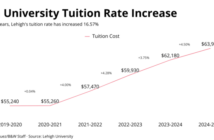The Latin American Studies Department held its first Latin Americanist Conference on March 30.
The Spanish word for borders — “fronteras” — inspired the conference’s title, Fronteras: The Latin American Border Experience Conference. The speakers at the conference were asked to focus on the concept of borders from the perspective of both aesthetics and social analysis.
The conference was held in Linderman Library and discussions were open to the public from 10 a.m. to 3:30 p.m.
The conference, which consisted of two panels, welcomed scholars from Latin American studies departments from various universities. The first panel focused on border aesthetics, and the second approached ideas of border socialites.
Megan Sheehan, a predoctoral fellow in Lehigh’s Latin American studies program, said the conference was a great opportunity for Lehigh faculty and students to engage in conversations with colleagues at other institutions. It allowed them to challenge themselves to think through borders from different disciplinary perspectives.
Sheehan believes borders and migration are important topics to the United States, regardless of geographic location. Scholars who spoke at each panel covered locations ranging across Chile, Mexico, Peru, the Amazonian frontier and the U.S.-Mexican border.
Sheehan’s discussion focused on Latin American migration to Chile. Her discussion introduced a Chilean domestic worker named Sophia. After conducting extensive interviews and connecting with her, Sheehan learned that Sophia’s employers monitored her personally and through surveillance technology.
“Migrants were molded into a submissive employee,” Sheehan said.
Some Chilean domestic workers suffered bag checks each week, were not entrusted with house keys and sometimes were forced to submit their passport to employers.
Sophia had expected to be recognized and appreciated for her work, but instead was subjected to strict rules and limitations from social interactions, leading to her resistance as an employee.
Hugo Ceron-Anaya, an assistant professor of sociology, spoke about race and class in Mexico. His discussion emphasized the tolerance of race within the Mexican culture, and the absence of fixed racial categories within the country.
Regardless of this prominent tolerance, racialized bodies developed within a race-free nation. Ceron-Anaya incorporated the requested aspect of social analysis into his title, Golf: A White Space. Here, golf was used to show the life of caddies in Mexico. Despite their deep knowledge of the sport and technical skill, Mexican caddies became part of a “no-white category.”
No one taught these caddies how to play. They learned by watching. However, similarly to Sophia in Sheehan’s presentation, they were not appreciated for their skill or knowledge. The game of golf allowed for the development of racial categories within a country of racial tolerance.
At the conclusion of the conference, history professor Barbara Zepeda, who moderated the second panel of the conference, shared her thoughts on the significance of Lehigh hosting its first Latin Americanist Conference.
She said it had been difficult to find numerous scholars focusing on these specific areas, but each speaker was asked to focus on the ways which border influenced aesthetics or social relations.
Zepeda found Lehigh’s ability to hold the conference to be of immense importance.
“The Latin American studies program is growing, especially in response to the growing Latino and Latin American student population,” she said.
Zepeda said Lehigh is beginning to see a new generation of Latin Americanists. Lehigh is a university in which students and faculty are able to study Latin American culture. Therefore, Zepeda believes conferences such as these will gain a strong foothold at the university, hopefully continuing next year and in the years to come.






Comment policy
Comments posted to The Brown and White website are reviewed by a moderator before being approved. Incendiary speech or harassing language, including comments targeted at individuals, may be deemed unacceptable and not published. Spam and other soliciting will also be declined.
The Brown and White also reserves the right to not publish entirely anonymous comments.